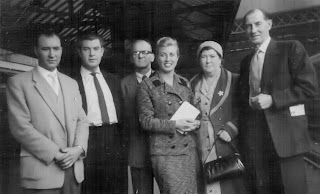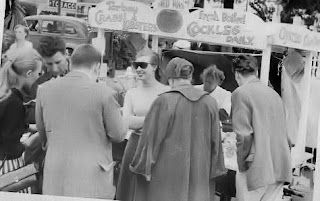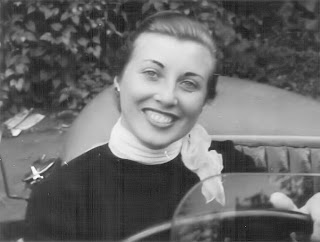Their first child, Clark, was born in February 1961 at the Middlesex Hospital in Mortimer Street. Stan was working at Ronnie Scott's, half a mile away. In December 1962, Sarah was born, prompting them to move to Brixton, a trendy place to be at that time.
 With Stan working every evening and often during the day as well, Jackie devoted herself to bringing up her kids and providing a stable environment for them. At the same time, of course, she was keeping a watchful eye on Stan's career and, through her previous connections at Decca, was able to orchestrate various recordings for him, including his most famous recording to date, the timeless "Under Milk Wood" in 1965 and a year later "Alice In Jazz Land". This album was filmed at Abbey Road Studios by the BBC with Jackie overseeing the event and clearly in shot.
With Stan working every evening and often during the day as well, Jackie devoted herself to bringing up her kids and providing a stable environment for them. At the same time, of course, she was keeping a watchful eye on Stan's career and, through her previous connections at Decca, was able to orchestrate various recordings for him, including his most famous recording to date, the timeless "Under Milk Wood" in 1965 and a year later "Alice In Jazz Land". This album was filmed at Abbey Road Studios by the BBC with Jackie overseeing the event and clearly in shot.Jackie had secured Stan a recording contract for EMI/Columbia's Lansdowne series, produced by her old pal Dennis Preston. While she continued to inspire and promote Stan's best interests outside of Ronnie Scott's Club (now moved to its present address in Frith Street), Jackie maintained a 'family first' attitude and ensured her children received the best education available locally and made sure they were never neglected.
 Unknown to Jackie however, Stan had developed a serious drug habit while trying to perform through the night in Soho, continuing to compose to deadlines and record extensively in the daytimes.
Unknown to Jackie however, Stan had developed a serious drug habit while trying to perform through the night in Soho, continuing to compose to deadlines and record extensively in the daytimes.When she eventually discovered what had happened to him in 1966, her first course of action was to remove him from that environment and help him to recover. With 2 children under the age of six, she helped him through his 'cold turkey' period and gradually brought Stan back to life.
At the end of the Sixties, they moved to a larger house in Streatham in South London. But jazz had fallen out of fashion. Work was very hard to find and they soon found themselves on social benefit. Stan even applied for a job in a sorting office for Royal Mail until Jackie found the application form and reminded him "You're a pianist, not a bloody postman". Heartbroken at the thought of the man she admired so much being prepared to give up music altogether, she decided to take action.
At this point, in the early Seventies, Jackie, with her lifelong friend thereafter, Hazel Miller, formed "Grass Roots Jazz Club" in Stockwell, South London. They promoted most of the new players at that time, also giving Stan the opportunity to perform on a more regular basis with some of the rising stars.
This wasn't enough though. She also established the first London based summer jazz course, receiving funding from GLAA and ILEA, which continued successfully for several years giving work to the top young jazz musicians of the day and encouraging a brand new generation of musicians for the future, including their teenage son Clark on drums.
Jackie then helped to set up Musicians' Action Group, a self help steering committee of musicians who demanded change in attitude towards British jazz musicians from the BBC and the media, as well as Lambeth New Music Society. From these meetings, the Jazz Centre Society (now Jazz Services) was formed and she felt that British jazz was back on the map, albeit a smaller one. By 1973 Jackie had managed to revive Stan's career to the extent that she promoted a concert at the Queen Elizabeth Hall, celebrating his 30th anniversary in jazz to a capacity audience, firmly establishing Stan as the giant she had always believed him to be.
In 1975 she decided to establish Steam Records as nobody in the major league seemed interested in recording jazz any more. Its first release was the reissue of Stan's best selling album ever since - "Under Milk Wood". It had just been voted Best Jazz Album in the Melody Maker polls, the only British recording in that category. The label was dedicated to recording Stan's latest projects after that. As Stan's reputation began to grow again, Jackie managed to secure several commissions for his quartet, sextet and octet, encouraging Stan to compose and tour again with various size line ups.
In August 1978, their son Clark, now aged 17, joined Stan's groups and joined him on the road. She now had two jazz musicians in the house and, as with Stan, sung his praises to all ears as only a proud mother could.































